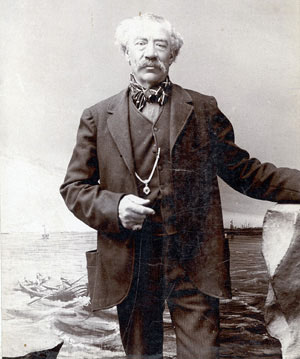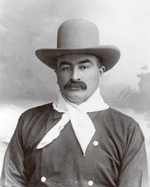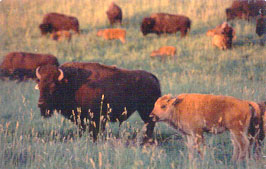Lesson
3
Preservation of the Buffalo
|
| |
|
|
In the 1800s, millions of buffalo
were killed by Indians and non-Indians. Their hides were made into clothing or blankets.
Their tongues were sold or traded as
delicacies. By 1890, the buffalo
was nearly extinct. Something had to be done. |

Photo courtesy of South Dakota
Department of Tourism
|
| |
|
The American Indians needed the
buffalo. It gave them food, shelter, and clothing. Some Indians
were the first to try to save the buffalo. They saw hunters
shooting the animals from trains. These Indians chased the animals away
from the railroads. They tried to herd them north. Their plan did
not work. |
|
|
|
|

Frederick Dupree
|
In 1883, a rancher saved five buffalo
calves. His name was Frederick Dupree. He found the calves
along the Grand River. In fifteen years, the five calves became a
herd of fifty-seven animals. |
|
|
|
|
After Dupree died, James
("Scotty") Philip bought the herd. He moved the
buffalo to his ranch. His ranch was near Fort Pierre. He built a
fence around the herd. By 1914, there were four hundred buffalo on
his ranch.
South Dakota bought thirty-six
buffalo from Philip. The state wanted to start a herd. The animals
were put in Custer State Park. Other people bought buffalo from
Philip, too. |

Scotty Philip
|
|
|
|

Photo courtesy of South Dakota
Department of Tourism
|
William Hornaday also wanted
to save the buffalo. He worked in New York City. Hornaday came to
the Great Plains. He was looking for buffalo. He wanted to take
them back to the East. He was able to find only a few animals.
Hornaday worked for
preservation of the buffalo. He
started the American Bison Society. The members were
conservationists. They
raised buffalo. They sold them to parks. Fourteen buffalo came to
Wind Cave National Park in South Dakota.
Now almost two hundred fifty thousand
buffalo live in North America. Many are
descendants
of the
buffalo that Scotty Philip bought.
|
| |
|
| |
|
| Vocabulary |
|
| conservationists
(n.), people who preserve or protect wildlife or nature
delicacies (n.),
foods that are not eaten often; treats
|
descendants
(n.), offspring such as children or grandchildren
preservation
(n.), keeping or protecting from harm
|
|